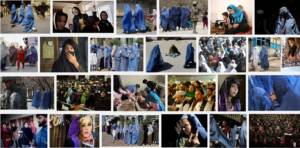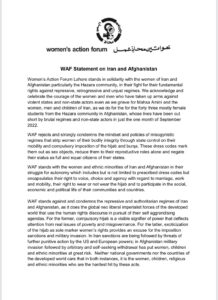
Press release, Lahore: Women’s Action Forum Lahore stands in solidarity with the women of Iran and Afghanistan particularly the Hazara community, in their fight for their fundamental rights against repressive, retrogressive and unjust regimes. We acknowledge and celebrate the courage of the women and men who have taken up arms against violent states and non-state actors even as we grieve for Mahsa Amini and the women, men and children of Iran as we do for the for the 43 mostly female students from the Hazara community in Afghanistan, whose lives have been cut short by brutal regimes and non-state actors in just the one month of September 2022.
WAF rejects and strongly condemns the mindset and policies of misogynistic regimes that strip women of their bodily integrity through state control on their mobility and compulsory imposition of the hijab and burqa. These dress codes mark them out as sex objects, reduce them to their reproductive roles alone and negate their status as full and equal citizens of their states.
WAF stands with the women and ethnic minorities of Iran and Afghanistan in their struggle for autonomy which includes but is not limited to prescribed dress codes but encapsulates their right to voice, choice and agency with regard to marriage, mobility, their right to wear or not wear the hijab and to participate in the social, economic and political life of their communities and countries.
WAF stands against and condemns the repressive and authoritarian regimes of Iran and Afghanistan, as it does the global neo liberal imperialist forces of the developed world that use the human rights discourse in pursuit of their self-aggrandising agendas. For the former compulsory hijab is a visible signifier of power that deflects attention from real issues of poverty and misgovernance. For the latter, exoticisation of the hijab as sole marker women’s rights provides an excuse for the imposition of sanctions and military invasion.
In Iran sanctions are being followed by threats of further punitive action by the US and European powers; in Afghanistan military invasion followed by arbitrary and self-seeking withdrawal has put women, children and ethnic minorities at great risk. Neither national governments nor countries of the developed world care, that in both instances, it is the women, children, religious and ethnic minorities who are the hardest hit by these acts.

WAF rejects and strongly condemns the mindset and policies of misogynistic regimes that strip women of their bodily integrity through state control on their mobility and compulsory imposition of the hijab and burqa. These dress codes mark them out as sex objects, reduce them to their reproductive roles alone and negate their status as full and equal citizens of their states.
WAF stands with the women and ethnic minorities of Iran and Afghanistan in their struggle for autonomy which includes but is not limited to prescribed dress codes but encapsulates their right to voice, choice and agency with regard to marriage, mobility, their right to wear or not wear the hijab and to participate in the social, economic and political life of their communities and countries.
WAF stands against and condemns the repressive and authoritarian regimes of Iran and Afghanistan, as it does the global neo liberal imperialist forces of the developed world that use the human rights discourse in pursuit of their self-aggrandising agendas. For the former compulsory hijab is a visible signifier of power that deflects attention from real issues of poverty and misgovernance. For the latter, exoticisation of the hijab as sole marker women’s rights provides an excuse for the imposition of sanctions and military invasion.
In Iran sanctions are being followed by threats of further punitive action by the US and European powers; in Afghanistan military invasion followed by arbitrary and self-seeking withdrawal has put women, children and ethnic minorities at great risk. Neither national governments nor countries of the developed world care, that in both instances, it is the women, children, religious and ethnic minorities who are the hardest hit by these acts.


